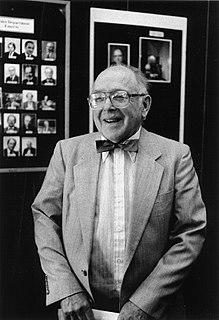A Quote by Hans Christian von Baeyer
Entropy is not about speeds or positions of particles, the way temperature and pressure and volume are, but about our lack of information.
Related Quotes
We know little of the consequences of the geoengineering process, such as spraying particles into the atmosphere that shade the planet from the sun's rays and could decrease its temperature. But this process is how dinosaurs disappeared from the Earth about 60 million years ago, by particles spewed by a volcano or a giant meteorite impact, and our species could follow suit.
You know, entropy is associated thermodynamically, in systems involving heat, with disorder. And in an analogous way, information is associated with disorder, which seems paradoxical. But when you think about it, a bit of information is a surprise. If you already knew what the message contained, there would be no new information in it.
So many of the properties of matter, especially when in the gaseous form, can be deduced from the hypothesis that their minute parts are in rapid motion, the velocity increasing with the temperature, that the precise nature of this motion becomes a subject of rational curiosity. Daniel Bernoulli, Herapath, Joule, Kronig, Clausius, &c., have shewn that the relations between pressure, temperature and density in a perfect gas can be explained by supposing the particles move with uniform velocity in straight lines, striking against the sides of the containing vessel and thus producing pressure.
The government must give proper weight to both keeping America safe from terrorists and protecting Americans' privacy. But when Americans lack the most basic information about our domestic surveillance programs, they have no way of knowing whether we're getting that balance right. This lack of transparency is a big problem.
We need a better way to talk about eating animals. We need a way that brings meat to the center of public discussion in the same way it is often at the center of our plates. This doesn't require that we pretend we are going to have a collective agreement. However strong our intuitions are about what's right for us personally and even about what's right for others, we all know in advance that our positions will clash with those of our neighbors. What do we do with that most inevitable reality? Drop the conversation, or find a way to reframe it?
Just as entropy is a measure of disorganization, the information carried by a set of messages is a measure of organization. In fact, it is possible to interpret the information carried by a message as essentially the negative of its entropy, and the negative logarithm of its probability. That is, the more probable the message, the less information it gives. Cliches, for example, are less illuminating than great poems.
A meat temperature gauge is a priceless tool. You can get a very inexpensive one at most hardware or sporting goods stores, which will easily help you determine the temperature of your meat so it is not over or undercooked. Pork is normally done at about 160, internal temperature. Steaks are cooked medium rare from 145 to 150. 165, medium. Well done is about 175, internal temperature.
Over the last century, physicists have used light quanta electrons, alpha particles, X-rays, gamma-rays, protons, neutrons and exotic sub-nuclear particles for this purpose. Much important information about the target atoms or nuclei or their assemblage has been obtained in this way. In witness of this importance one can point to the unusual concentration of scattering enthusiasts among earlier Nobel Laureate physicists. One could say that physicists just love to perform or interpret scattering experiments.
If you like, there is a Guinness time. The reason for that it's fundamental. It is not that we have to keep shortening the time. It turns out all molecular and biological systems have speeds of the atoms move inside them, the fastest possible speeds are determined by their molecular vibrations and this speeds is about a kilometre per second.
There is so much information that our ability to focus on any piece of it is interrupted by other information, so that we bathe in information but hardly absorb or analyse it. Data are interrupted by other data before we've thought about the first round, and contemplating three streams of data at once may be a way to think about none of them.
































